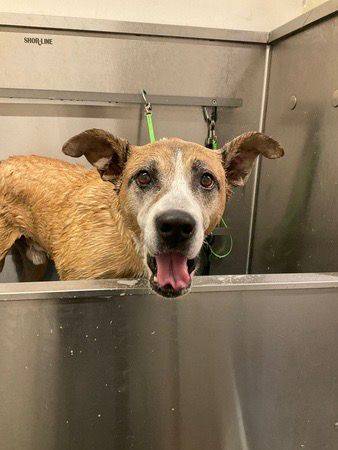Have you ever wondered if you can get paid to be a dog foster? If you love dogs and want to help them find forever homes, this question might be on your mind.
Taking care of a foster dog can be rewarding, but you might also be curious about the financial side. Can you earn money while giving a dog a temporary home? Keep reading to discover the truth about getting paid to foster dogs and what you need to know before you start.
This could change the way you think about helping pups in need.
What Is Dog Fostering
Dog fostering means opening your home temporarily to dogs in need. These dogs come from shelters, rescues, or situations where they can’t stay long-term. You provide care, love, and a safe space until they find their forever family.
Fostering isn’t just about giving a dog a roof. It’s about helping them heal, learn good behavior, and regain trust in humans. You become a vital part of their journey, often making the difference between life and death for these animals.
What Does A Dog Foster Do?
As a foster, you feed, exercise, and monitor the dog’s health daily. You may also help with basic training and socialization to prepare them for adoption. Your role is hands-on and requires patience and commitment.
Many fosters describe it as rewarding but challenging. You see progress firsthand and know you’re saving lives. Have you ever thought about how much impact your care could have?
How Long Does Dog Fostering Last?
The length varies depending on the dog’s needs and the rescue’s situation. Some dogs stay only a few days; others may need weeks or even months. Flexibility is key because fostering schedules often change unexpectedly.
Knowing this helps you plan your time realistically. Are you ready for a short-term guest or something longer?
Who Can Become A Dog Foster?
Almost anyone with a safe home and time to care for a dog can foster. Rescues usually require a home visit and some basic checks. Experience with dogs is helpful but not always necessary.
If you have children or other pets, rescues will consider that too. Think about your lifestyle and whether you can provide a calm, stable environment.

Credit: losangeles.craigslist.org
How Dog Fostering Works
Dog fostering helps animals find safe homes before adoption. It involves caring for dogs temporarily in a home setting. This process saves lives and prepares dogs for their forever families. Understanding how dog fostering works helps you decide if it fits your lifestyle.
Applying To Become A Dog Foster
First, you contact a local shelter or rescue group. They ask about your home, lifestyle, and experience with dogs. You may fill out an application form. Some groups require a home visit or interview. This step ensures the dog matches your environment.
Receiving A Foster Dog
The shelter assigns a dog that suits your home. You get information about the dog’s age, health, and behavior. The group often provides supplies like food and a crate. You prepare your home to keep the dog safe and comfortable.
Caring For The Foster Dog
You feed, exercise, and train the dog daily. You watch for any health or behavior issues. You give the dog love and attention. You keep the shelter updated on the dog’s progress. Sometimes, you may take the dog to vet visits.
Helping The Dog Find A Home
You may help by sharing the dog’s story on social media. The shelter arranges meet-and-greet sessions with potential adopters. You provide feedback about the dog’s personality and habits. Once adopted, you prepare the dog for the new family.
Getting Support From The Shelter
The shelter offers advice and training tips. They cover medical expenses for the dog. You can ask questions about any problem. Support helps you give the best care to the foster dog.
Payment Options For Dog Fosters
Dog fostering often involves different types of payment options. Some fosters work purely as volunteers. Others receive small payments or reimbursements. A few programs offer paid positions for fosters. Understanding these options helps set clear expectations before starting.
Volunteer-based Fostering
Many dog fosters volunteer their time and resources. They do not receive money for care or supplies. The main reward is the joy of helping dogs. Volunteers cover food, toys, and vet visits themselves. This option suits people who want to contribute without financial support.
Stipends And Reimbursements
Some shelters offer stipends to help with costs. These are small payments to cover food and medicine. Reimbursements may be given after submitting receipts. This option lowers financial burden on fosters. It ensures dogs get needed supplies without extra cost to the foster.
Paid Foster Programs
Certain organizations hire fosters as paid workers. These programs pay a regular wage or hourly rate. The foster acts like a temporary caregiver and employee. Paid fosters handle all dog care expenses. This option suits people needing income while fostering dogs.
Expenses Covered By Organizations
Many organizations that arrange dog fostering help cover key expenses. This support makes fostering easier and less costly. It lets caregivers focus on the dogs’ well-being. Knowing what costs are covered helps set clear expectations.
Food And Supplies
Most groups provide food for foster dogs. They may also supply treats, toys, and bedding. These items keep dogs healthy and comfortable. Foster families usually do not pay for these basics.
Veterinary Care
Veterinary costs are often covered by the organization. This includes vaccinations, check-ups, and emergency care. Sometimes spaying or neutering is included too. Foster families rarely pay for medical needs.
Other Support
Some organizations offer extra help beyond food and vet care. This can include training advice or transportation to vet visits. They may provide supplies for cleaning or grooming. Support like this eases the foster experience.
Benefits Beyond Money
Being a dog foster offers rewards that go beyond any paycheck. Many people find joy, growth, and a sense of purpose through fostering dogs. The benefits touch your heart, build your skills, and impact the community in meaningful ways.
Emotional Rewards
Caring for a foster dog brings deep emotional satisfaction. You provide love and safety to an animal in need. Watching a dog heal and thrive fills you with pride. The bond formed with the dog creates lasting memories. It also brings happiness and reduces stress in your daily life.
Building Skills
Fostering teaches valuable skills you can use forever. You learn about dog behavior and health needs. Training and socializing dogs improve your patience and communication. These skills can help with your own pets or future fostering. It also builds responsibility and problem-solving abilities.
Community Impact
Fostering helps save lives and eases shelter overcrowding. You become part of a network working to protect animals. Your efforts raise awareness about animal welfare in your area. Each foster dog adopted means one less animal on the street. This creates a kinder, safer community for pets and people alike.

Credit: ventura.craigslist.org
Factors Affecting Foster Compensation
Foster compensation varies widely based on several factors. These elements influence how much support or payment a foster caregiver receives. Understanding these factors helps set realistic expectations for those interested in fostering animals.
Foster programs differ in resources and policies. The type of animal needing care also plays a role. Time commitment impacts the level of compensation or support provided.
Location And Organization
Different regions offer varying compensation rates. Urban areas may have more resources than rural ones. Each organization has its own budget and rules. Some provide full financial support, others only partial help. Local demand for foster homes affects compensation too.
Type Of Animal
Small pets usually cost less to care for. Large dogs or special needs animals require more resources. Exotic pets or animals with health issues may get higher support. The animal’s age and medical needs also matter. These factors affect food, medical care, and supplies costs.
Time Commitment
Short-term fosters might receive less compensation. Long-term or intensive care often comes with more support. The number of hours spent daily impacts help offered. Some programs reward consistent or extended care. Time spent on training or socializing may also be considered.
How To Find Paid Foster Opportunities
Finding paid dog foster opportunities takes more than just love for animals. It requires research, networking, and understanding what shelters or organizations offer compensation. You might be surprised to learn that some programs provide stipends, reimbursements, or even full payments to cover your time and expenses.
Search Local Animal Shelters And Rescue Groups
Start by contacting animal shelters and rescue organizations in your area. Many have foster programs and may offer paid opportunities, especially for dogs with special medical needs or those requiring extensive care.
Ask about their policies on compensation. Some shelters provide monthly stipends to help with food, supplies, or vet bills. Don’t hesitate to inquire about how they support their fosters financially.
Use Online Platforms Dedicated To Animal Fostering
Several websites connect fosters with animals in need, and some list paid foster positions. Platforms like Petfinder or RescueGroups can help you find opportunities beyond your local area.
Look for listings that mention reimbursement or payment. These platforms often allow you to filter searches based on paid or volunteer status, making your hunt more efficient.
Network With Experienced Dog Fosters
Talk to people already fostering dogs, either in your community or through online forums and social media groups. They can share valuable tips and may know about paid foster roles that aren’t widely advertised.
Have you considered joining Facebook groups or Reddit communities focused on dog fostering? These spaces often have up-to-date postings and firsthand insights on which organizations pay fosters.
Reach Out To Specialty Rescue Organizations
Some rescues focus on specific breeds or dogs with health issues and often need paid fosters for intensive care. These groups typically cover medical expenses and offer compensation because the foster’s role is more demanding.
Explore breed-specific rescues or those dedicated to senior dogs or those recovering from surgery. Your willingness to take on a challenging case could open doors to paid fostering.
Attend Local Adoption Events And Workshops
Visiting adoption events gives you a chance to connect face-to-face with shelter staff and volunteers. Ask directly about paid fostering opportunities and what criteria you need to meet.
Workshops or training sessions often reveal hidden paid roles. Plus, they prepare you better, increasing your chances of becoming a paid foster.
Common Misconceptions About Foster Pay
Many people wonder if fostering dogs means getting paid like a regular job. There are several common misunderstandings about how foster pay works, and clearing them up can help you decide if fostering fits your lifestyle and expectations. Let’s look at what fostering really involves when it comes to money and support.
Foster Pay Means A Salary
One big misconception is thinking fostering dogs comes with a steady paycheck. Usually, fostering is a volunteer role. You don’t earn a salary or hourly wages like a typical job.
Instead, most rescues or shelters cover specific costs related to the dog’s care. This can include food, vet bills, and supplies—but it’s not the same as getting paid for your time.
Reimbursement Covers All Expenses
Another mistake is assuming the reimbursement fully covers every expense. While organizations often provide funds or supplies, sometimes you’ll need to pay out of pocket. You might buy extra treats, toys, or grooming items that aren’t reimbursed.
Think about your own budget before fostering. Can you handle occasional extra costs? Many fosters find joy in giving their time and resources, but it helps to be prepared financially.
Fostering Is A Way To Make Money
Some people believe fostering dogs is a way to earn extra income. The truth is, fostering is about helping animals, not making money. If earning income is your goal, fostering might not be the right fit.
Instead, you gain valuable experience, emotional rewards, and the chance to save lives. Ask yourself if these rewards are enough motivation for you.
Support Varies By Organization
Not all rescue groups handle foster pay the same way. Some provide full supplies and vet care, while others expect fosters to cover more costs. Knowing the policies of the organization you work with is key.
Contact your local rescues and ask detailed questions about what expenses they cover. This will help you avoid surprises and manage your expectations.

Credit: spca.bc.ca
Frequently Asked Questions
Do Dog Fosters Receive Financial Compensation?
Dog fosters typically do not receive direct financial compensation. However, some organizations cover expenses like food and veterinary care. This support helps alleviate the financial burden on the foster family. The primary reward is the joy of helping a dog in need and the satisfaction of contributing to a good cause.
What Costs Are Covered For Dog Fosters?
Most fostering organizations cover essential costs. These usually include food, medical care, and necessary supplies. This support ensures the dog’s well-being without financial stress on the foster family. Always check with the specific organization for details on what they provide for fosters.
How Long Does Dog Fostering Last?
The duration of dog fostering varies. It can range from a few weeks to several months. The length depends on the dog’s needs and the speed of finding a permanent home. Fosters should be prepared for flexible time commitments and communicate with the organization for updates.
Are There Benefits To Fostering Dogs?
Yes, fostering dogs offers several benefits. Fosters gain companionship and the joy of helping animals. It’s also a great way to determine if owning a dog suits your lifestyle. Additionally, fosters contribute to reducing overcrowding in shelters, making a positive impact on the community.
Conclusion
Being a dog foster can bring joy and a sense of purpose. Some programs offer small payments or reimbursements. Most fosters do it for love, not money. It helps dogs find better homes and stay safe. You gain experience caring for pets.
It can be hard but very rewarding. Think about your time and resources before starting. Every dog needs someone who cares. Could you be that person?

Emily Barker is the founder of ChillDogLife.com, a space dedicated to helping pup parents discover the best dog products, lifestyle tips, and cozy ideas for happier homes.
A lifelong dog lover, Emily combines her passion for pets with a knack for research to share trusted recommendations on everything from toys and furniture to health and everyday care.
Her goal is simple: to make life easier, stylish, and more joyful for dogs and the people who love them.







